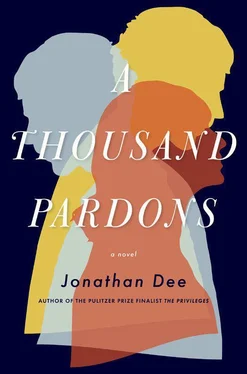The first interview was at Condé Nast. She’d subscribed to some website that listed an editorial assistant’s job at Condé Nast Traveler , but apparently all the job openings at all the Condé Nast magazines funneled down into one big slough of HR despond that didn’t differentiate between one magazine and another. Too bad, because work at a travel magazine sounded attractive to Helen, but it scarcely mattered in the end because it seemed she had grossly misunderstood the nature of an editorial assistant’s job in the first place. She thought it had to do with assisting in the editing of the magazine, a notion of which the HR person disabused her with the exaggerated patience usually reserved for dealing with the very old. The second interview was for a fundraiser’s job with the Mercantile Library. It seemed to go well enough. At least there was no condescension or hostility involved, not on a visible level anyway. She did notice a sort of quizzical cock of the head when she answered the interviewer’s question about the size of the average donation she’d solicited in her work for the town library in Rensselaer Valley. Still, asking for money was asking for money: how different could it be?
She ate lunch at a Chipotle — horrible, but she didn’t want to go anywhere nicer and ask for a table for one. Her dignity had taken enough hits as it was. Nervously she checked her cell to make sure there was no emergency call from Sara or from Sara’s school. The way her life had been going lately, it would figure that such a call might come on the one day she was two hours from home and didn’t want anybody to know about it. Her third interview was in the neighborhood of the Empire State Building, in a shabby little office building with a lobby about as wide as a walk-in closet. Judging from the framed directory she perused as she waited a minute and a half for the one elevator, it seemed mostly full of accountants and tax preparers; she was headed, though, for Harvey Aaron Public Relations. They had advertised, in the Times , for an entry-level position as junior vice president, which was confusing, though less so after she walked in and saw that the office consisted of two rooms of identical size, one of which belonged to Harvey Aaron and the other to everyone else — three desks, two of which were occupied by bored-looking young Latina women reading magazines. The third desk, presumably that of the junior vice president, had a pair of running shoes on it.
When Harvey stood up to greet her as she entered, he was still holding a plastic fork and a container of some sort of pasta salad. “Come in, sit down, excuse me,” he said, looking around for something suitable on which to wipe his fingers, eventually just giving up and waving her into the room’s only other chair. He was older than Helen, maybe sixty or a dissipated fifty-five, and she was comforted by that, since her other stops that day had contributed to the sense that no one worked aboveground in Manhattan who was over the age of forty. He wore a beige suit and a blue tie, a rather stylish one (though it had a new oil stain on it), which suggested the attentions of a Mrs. Aaron. He seemed a little nervous just to see her walk in, as if she weren’t the kind of person who normally came around during the day, and maybe for that reason she felt like she could relax a little in front of him.
“Sorry to interrupt your lunch,” she said.
“Well, you weren’t. I mean you sort of were, but as Mona out there will tell you, I don’t really have a set lunchtime, I’m just kind of picking at food all day. Helps me think. Mona?” he said suddenly, much louder. “Any napkins out there, by any chance?” Mona didn’t appear, not then or for the remainder of the interview. “So where do we begin? I never know where to begin these things. I know I have your résumé on the computer somewhere.” He tapped a few keys and sat back hopefully. “No,” he said. He typed something else and hit Return with a flourish. “Son of a bitch,” he muttered, and then flinched guiltily. Helen unsnapped her bag and slid him another copy of her CV.
He looked it over. “Computer skills are obviously a big requirement around here,” he said. “Just kidding. Anyway, I don’t see any sort of public relations background here, and for this job, even though it could technically be an entry-level thing, I am kind of hoping for someone with some experience in the field. Of course I may not get that. You have no experience at all in the field?”
“Not in public relations per se,” Helen said gamely.
“Not per se? What do you mean? You have experience that’s whatever is the opposite of per se? Per don’t say?”
Helen laughed. There was something very unassuming about him, both cheerful and apologetic, even as he was in the process of brushing her off just like everyone else had. “Well, I guess what I mean,” she said, “is that I’m actually not entirely sure what it is you do.”
He raised his eyebrows. “ ‘You’ meaning me, or ‘you’ meaning what the hell does ‘public relations’ mean in general?”
“Both,” she said, surprising herself with her bravery. If this had happened at Condé Nast, she would have smoothed out her skirt and left by now.
He pursed his lips. “Rensselaer Valley,” he said, surprisingly. “Nice town. I have a house in New Paltz myself. May I–I hope you won’t think I’m presumptuous if I ask you something?”
“Not at all.”
“There is a certain thinness to this résumé,” he said, quite kindly, “a certain, um, provincial quality, that suggests to me that you have a life — a married life, a family life — in which circumstances have maybe changed recently?”
Helen colored, and nodded. She had meant for the CV to cover that up, not reveal it.
“And you have children?” he went on. “Because this is the résumé of someone who has spent the last ten or fifteen years raising a family—”
“One child,” Helen said. “Yes.”
Harvey beamed at her, as if she would want to share in his professional pride at having guessed these embarrassing facts about her. “Then you already know what we do,” he said, tilting his chair backwards. “We tell stories. We tell stories to the public, because stories are what people pay attention to, what they remember. Why? Because when they were little, they had devoted, beautiful mothers like you, who told them stories, and stories are how they first learned to make sense out of the whole big, confusing world.”
“Stories,” Helen said indulgently, though the truth was that his mere invocation of Sara, whom he did not know, whose existence was no more than generic to him, had caused a little tightness in her throat that kept her from wanting to risk saying anything more. That kind of thing had happened to her a lot these last few weeks.
“Now, because our services cost money, the protagonists of these stories tend to be people who are rich, or famous, or better yet rich and famous. But the stories themselves are everyman stories, familiar. Archetypal. Am I pronouncing that right? We put these figures in stories whose outcomes we’re already familiar with from childhood, so that way we know how the audience will judge them when we finish telling them. The stories lead the people to the judgment we want. Is all this making sense?”
“Don’t they ever object?” Helen asked.
“Who?”
“The celebrities, the rich people. Do they ever resist being put into these everyman stories?”
Harvey smiled, a little condescendingly, Helen thought. “They’re used to it. They live in publicity, it’s like their atmosphere, so they already know they’ll get judged, and it’s just a question of influencing how. Unlike the rest of us, they don’t really have the option of assuming there’s no one watching. Anyway, it’s what they pay us for. We don’t go to them, you understand; they come to us. Do you know any celebrities yourself?”
Читать дальше












